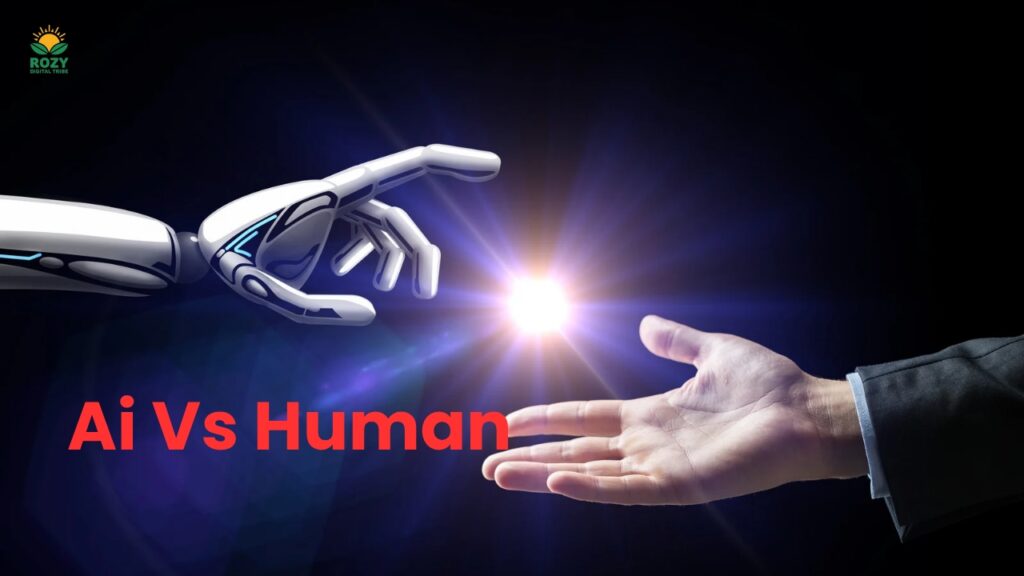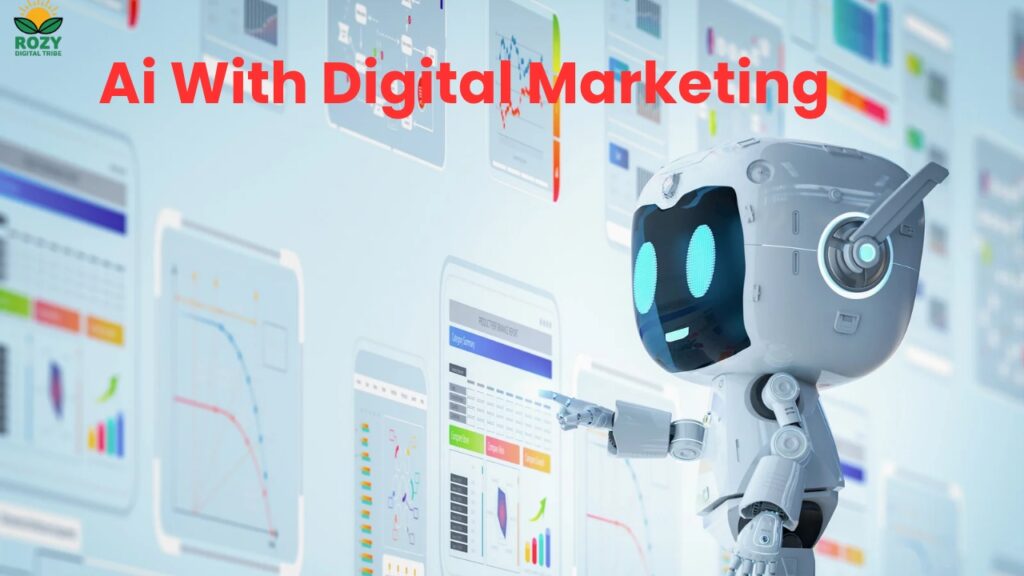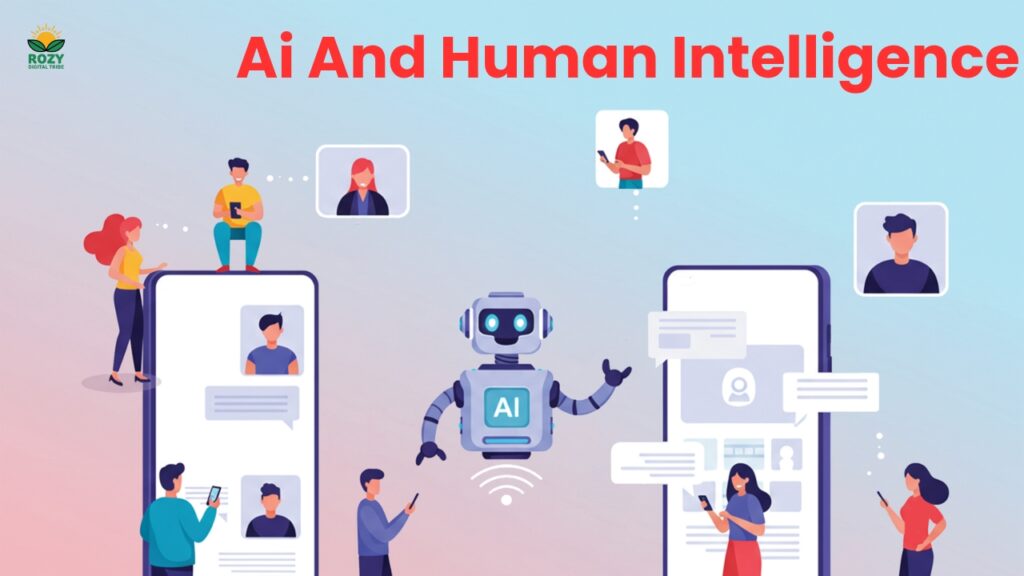Table of Contents
ToggleAi Vs Human Who Wins In Digital Marketing 2025
Ai Vs Human Who Wins In Digital Marketing 2025. As we step deeper into the era of automation and artificial intelligence, the digital marketing world faces a thought-provoking debate: AI vs. Human—who truly dominates digital marketing in 2025?
From chatbots and content creation tools to campaign optimization and predictive analytics, AI has taken the marketing world by storm. But can machines replace human empathy, intuition, and storytelling? Or is AI the ultimate game-changer, revolutionizing how we market and scale brands?
In this blog, we dive deep into the capabilities of both AI-powered marketing tools and human marketers, compare their strengths and weaknesses, and uncover who’s winning the digital marketing race in 2025.

What is AI in Digital Marketing?
AI (Artificial Intelligence) in digital marketing refers to the use of machine learning, automation, and algorithms to enhance marketing strategies, execute campaigns, analyze data, and personalize customer experiences.
Also Read -: Ai vs Traditional Marketing What Works Best 2025
Key AI Marketing Tools in 2025 Include:
Chatbots and AI Assistants (e.g., ChatGPT, Drift)
Content Generation Tools (e.g., Jasper AI, Copy.ai)
Predictive Analytics
Email Automation Platforms
Voice Search Optimization Tools
Programmatic Advertising Software
AI Image and Video Generators
How AI Has Revolutionized Digital Marketing

1. Data-Driven Decisions at Lightning Speed
In the battle of AI vs. Human: Who Wins in Digital Marketing 2025, AI clearly takes the lead when it comes to data-driven decision-making. AI-powered tools can analyze massive volumes of customer data in real-time, uncovering patterns, trends, and insights that would take human marketers hours—or even days—to identify.
With machine learning algorithms and predictive analytics, marketers can now make faster, smarter campaign decisions. While humans offer valuable strategic input, AI’s ability to process data at lightning speed gives businesses a competitive edge in today’s fast-paced digital landscape.
2. Hyper-Personalization
In the debate of AI vs. Human: Who Wins in Digital Marketing 2025, AI has revolutionized hyper-personalization like never before. AI can segment audiences, track user behavior, and deliver customized content at scale—something that’s nearly impossible for humans to manage manually.
From personalized product recommendations to dynamic email content and real-time website experiences, AI helps brands create meaningful connections with each customer.
While humans bring creativity and emotional understanding to the strategy, AI enables marketers to deliver ultra-targeted campaigns that boost engagement and conversions.
3. Smart Content Creation
When discussing AI vs. Human: Who Wins in Digital Marketing 2025, content creation is where the lines begin to blur. AI tools like ChatGPT, Jasper, and Copy.ai are now capable of generating high-quality blog posts, social media captions, ad copy, and even video scripts in seconds.
These tools analyze top-performing content, trending keywords, and audience preferences to produce optimized material quickly. However, while AI excels at speed and data-backed writing, human marketers still shine in storytelling, emotional depth, and brand voice.
The real power lies in combining AI’s efficiency with human creativity to produce smart, engaging content at scale.
4. Enhanced Customer Experience
In the ongoing debate of AI vs. Human: Who Wins in Digital Marketing 2025, customer experience is a key battlefield. AI enhances customer journeys through real-time chatbots, personalized recommendations, voice assistants, and predictive responses.
These tools provide instant support and 24/7 assistance, ensuring that users get what they need without delay. AI analyzes user behavior to anticipate needs and tailor every interaction.
However, humans bring empathy, emotional intelligence, and problem-solving to complex situations that machines can’t fully replicate. In 2025, the winning strategy is a hybrid—leveraging AI for speed and personalization, while humans handle emotional engagement and trust-building.
5. Efficient Ad Targeting
In the competition of AI vs. Human: Who Wins in Digital Marketing 2025, AI is leading the way in efficient ad targeting. With machine learning algorithms and advanced data analytics, AI can identify the right audience, at the right time, on the right platform.
It continuously analyzes user behavior, demographics, and engagement to optimize ad performance and reduce wasted ad spend. Unlike traditional manual targeting by humans, AI-driven campaigns adjust in real-time, improving ROI and conversion rates.
While human marketers still play a crucial role in crafting compelling ad creatives and strategy, AI handles the heavy lifting of precision targeting.
The Role of Human Creativity in Digital Marketing
1. Emotional Connection & Storytelling
In the evolving debate of AI vs. Human: Who Wins in Digital Marketing 2025, emotional connection and storytelling remain strongholds of human marketers.
While AI can generate content based on data and trends, it lacks the emotional depth and human experience needed to craft truly resonant stories.
Consumers connect with brands that share authentic messages, personal journeys, and emotional storytelling—something only humans can genuinely create. In 2025, emotional marketing continues to be a powerful tool for building trust, loyalty, and brand identity.
AI can assist in analyzing which stories perform best, but it’s the human touch that truly moves people.
2. Brand Identity & Voice
In the ongoing conversation around AI vs. Human: Who Wins in Digital Marketing 2025, maintaining a consistent and authentic brand identity is where humans have the upper hand.
While AI can mimic tone and style to a certain extent, it still struggles to fully capture the nuance, personality, and emotional essence of a brand. Brand voice is built on values, culture, and human experiences—areas where human marketers excel.
They understand context, cultural relevance, and audience sentiment, ensuring that every message aligns with the brand’s core identity. AI can support by offering content suggestions and consistency, but humans define and protect the brand’s soul.
3. Creative Campaigns
When it comes to AI vs. Human: Who Wins in Digital Marketing 2025, creative campaigns still favor the human edge. While AI tools can generate ideas, test headlines, and even create visuals, the originality and out-of-the-box thinking required for a truly viral or memorable campaign are still rooted in human creativity.
Humans understand emotions, culture, humor, and timing—essential ingredients in building impactful campaigns. AI can assist by analyzing past campaign data, predicting trends, and automating A/B testing, but the spark of innovation and storytelling behind a successful campaign still belongs to human marketers.
4. Cultural Sensitivity
In the discussion of AI vs. Human: Who Wins in Digital Marketing 2025, cultural sensitivity is a critical area where humans outperform AI. While AI can translate languages and adapt content for different regions, it often lacks the deep understanding of cultural context, social norms, and local traditions.
A message that works in one market might be offensive or misunderstood in another—and recognizing these nuances requires human insight.
Human marketers bring emotional intelligence and cultural awareness to campaigns, ensuring that brand messaging is respectful, relevant, and well-received across diverse audiences. AI can support with localization, but humans are essential for culturally sensitive storytelling.
5. Ethical Decision Making
In the debate of AI vs. Human: Who Wins in Digital Marketing 2025, ethical decision-making clearly highlights the importance of human involvement. AI follows algorithms and data patterns but lacks moral judgment and the ability to understand ethical implications.
Issues like user privacy, data protection, misleading content, and manipulative advertising require human marketers to make conscious, responsible choices. As digital marketing becomes more AI-driven, human oversight is critical to ensure transparency, fairness, and accountability.
While AI enhances efficiency, humans uphold values—making ethical marketing a distinctly human responsibility in the AI-powered landscape.
Head-to-Head Comparison: AI vs. Human Marketers
| Criteria | AI Tools | Human Marketers |
|---|---|---|
| Speed | Extremely fast | Slower in comparison |
| Data Analysis | Excellent | Limited by capacity |
| Creativity | Lacks originality | Deeply creative |
| Emotional Intelligence | Non-existent | High |
| Scalability | Mass production possible | Limited to resources |
| Cost Efficiency | Cost-effective long-term | Higher cost per hour |
| Adaptability | Learns from data | Learns from context & culture |
| Strategy & Innovation | Limited | Unmatched |
| Ethical Judgment | Algorithm-based | Morally guided |
| Personal Connection | Robotic | Empathetic & human |
How to Combine AI and Human Intelligence for Marketing Success

1. Humans Strategize, AI Executes
In the dynamic face-off of AI vs. Human: Who Wins in Digital Marketing 2025, the smartest marketers know it’s not about competition—it’s about collaboration. Humans excel at strategic thinking, creative planning, and understanding the bigger picture.
They define campaign goals, target audience personas, messaging tone, and overall brand direction. AI, on the other hand, takes these strategies and executes them with unmatched speed and precision.
From automating email sequences to optimizing ad spend and tracking performance metrics, AI handles the heavy lifting. The winning formula in 2025 is clear: humans lead with strategy, and AI powers the execution for maximum impact.
2. AI Creates, Humans Refine
In the evolving landscape of AI vs. Human: Who Wins in Digital Marketing 2025, a powerful synergy emerges—AI creates, humans refine. AI tools can quickly generate content, design layouts, suggest keywords, and even draft social media posts or blog articles.
However, raw AI output often lacks the nuance, emotion, and contextual understanding that humans naturally provide. That’s where marketers step in—to edit, polish, and align the content with the brand’s voice, values, and audience expectations.
In 2025, the most effective marketing teams use AI for speed and scale, but rely on human creativity and judgment to ensure quality and impact.
3. Data from AI, Decisions by Humans
In the debate of AI vs. Human: Who Wins in Digital Marketing 2025, one truth stands out: AI delivers the data, but humans make the decisions. AI excels at collecting, organizing, and analyzing vast amounts of marketing data—from customer behavior and website analytics to ad performance and market trends.
It provides deep insights, predictive analytics, and real-time reporting that empower marketers with valuable information.
However, the strategic decisions—what to prioritize, how to respond, and which direction to take—are still made by humans who understand brand goals, ethics, and emotional nuance. In 2025, data is the foundation, but human judgment builds the strategy.
4. Customer Service Hybrid
In the ongoing debate of AI vs. Human: Who Wins in Digital Marketing 2025, customer service stands as a clear example of the power of a hybrid approach.
AI-driven chatbots and virtual assistants now handle basic queries, FAQs, and transactional tasks 24/7—offering instant support and reducing wait times. However, when it comes to handling complex issues, emotional conversations, or personalized problem-solving, human agents step in to provide empathy, understanding, and real connection.
This blend of AI efficiency and human compassion ensures a seamless, satisfying customer experience. In 2025, the best customer service strategies are not AI or human—they’re both.
Real-World Use Cases: AI and Humans Working Together
1. Email Campaign Optimization
In the race of AI vs. Human: Who Wins in Digital Marketing 2025, email campaign optimization is a space where AI is transforming the game—but humans still play a key role. AI tools can analyze open rates, click-through rates, audience behavior, and send times to automatically optimize email performance.
It can segment audiences, personalize subject lines, and even A/B test content in real time. However, the emotional tone, storytelling, and alignment with brand voice still require human input.
In 2025, the most successful email campaigns are those where AI handles the data-driven execution, and humans refine the message to truly connect with the audience.
2. Paid Ads Performance
When it comes to AI vs. Human: Who Wins in Digital Marketing 2025, paid ads performance is a clear showcase of AI’s strength—combined with human creativity. AI platforms like Google Ads and Meta Ads now use machine learning to automatically optimize bidding strategies, audience targeting, and ad placements.
These systems constantly analyze performance metrics and adjust campaigns in real time for better ROI. However, it’s human marketers who craft compelling ad creatives, write persuasive copy, and strategize messaging that resonates with the target audience.
In 2025, the winning ads come from the perfect blend: AI powers the performance, and humans inspire the message.
3. SEO and Content
In the race of AI vs. Human: Who Wins in Digital Marketing 2025, SEO and content creation represent a strong collaboration between both forces.
AI tools are now capable of performing advanced keyword research, analyzing search trends, generating SEO-friendly outlines, and even writing basic blog posts. They help marketers optimize content for better rankings, faster indexing, and increased visibility.
However, high-quality content that engages readers, tells stories, and builds trust still requires the human touch. Humans understand search intent, tone, and emotional engagement—critical for meaningful content. In 2025, AI accelerates SEO, but humans elevate content to a level that truly connects.
4. Social Media Marketing
In the landscape of AI vs. Human: Who Wins in Digital Marketing 2025, social media marketing thrives on the balance between automation and authenticity.
AI tools can schedule posts, analyze engagement metrics, suggest optimal posting times, and even generate caption ideas or hashtags. They save time and boost efficiency. But successful social media is more than metrics—it’s about genuine connection, storytelling, and community building.
That’s where humans shine. They understand cultural trends, humor, emotional cues, and brand voice—elements AI can’t fully grasp. In 2025, the most impactful social media strategies blend AI efficiency with the creativity and empathy of human marketers.
So, Who Wins in 2025? AI or Human?
In the final showdown of AI vs. Human: Who Wins in Digital Marketing 2025, the answer isn’t a simple one—or one-sided. The real winner is collaboration.
AI brings unmatched speed, precision, and data-processing power. It helps marketers automate tasks, optimize campaigns, predict trends, and reach the right audience at the right time. It’s your tireless digital assistant, working 24/7 to deliver results faster and smarter.
Humans, however, bring something AI can’t replicate—emotion, ethics, creativity, and intuition. We understand storytelling, build real connections, and make thoughtful, value-driven decisions. Human marketers create the strategy, design the narrative, and breathe life into a brand.
In 2025, digital marketing success isn’t about choosing AI or humans—it’s about integrating both. The most powerful marketing teams use AI to scale and optimize, while relying on human intelligence to lead, connect, and inspire.
So, who wins in 2025?
They both do—together.
Conclusion
As we’ve explored in this journey of AI vs. Human: Who Wins in Digital Marketing 2025, digital marketing in 2025 isn’t about replacing humans or fearing AI. It’s about embracing collaboration. AI helps you scale faster, smarter, and more efficiently. Humans ensure that your message connects, inspires, and converts.
If you’re a digital marketer or business owner, don’t ask whether AI will take your job—ask how AI can help you do your job better.
The future of digital marketing is not AI vs. Human—it’s AI with Human.
If you also want to learn digital marketing with ai, how to use ai tools and also want to learn advanced marketing, then hello my name is Rozy Sawant, I am an ai digital marketing coach and consultant, if you also want to learn all this, then register for my upcoming workshop.
I will meet you soon on live zoom, seats are limited for my workshop, register quickly. Click on the button given below to register.
Frequently Asked Questions (FAQs)
-
1. Can AI replace human marketers completely?
No. While AI can automate many tasks, it cannot replace human creativity, emotion, and ethical decision-making.
-
2. What AI tools are used in digital marketing in 2025?
Popular tools include ChatGPT, Jasper AI, Copy.ai, Canva AI, HubSpot, Surfer SEO, and Google Ads AI.
-
3. What are the disadvantages of using AI in marketing?
AI lacks emotional intelligence, may produce generic content, and can raise data privacy and ethical concerns.
-
4. How can humans and AI work together in marketing?
Humans provide strategy and creativity, while AI handles automation, data analysis, and execution.
-
5. Is learning AI important for digital marketers in 2025?
Yes! Understanding AI tools is crucial to stay competitive and enhance productivity in modern digital marketing.
